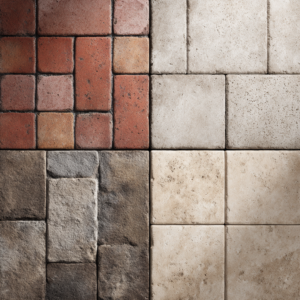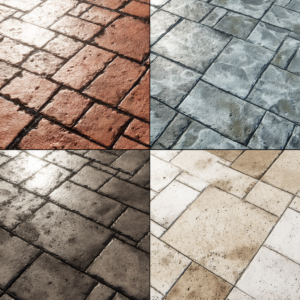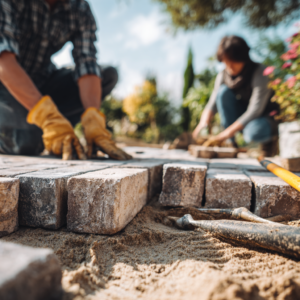Choosing the right paving material is crucial when it comes to enhancing the aesthetics and functionality of your outdoor spaces. The discussion of porcelain pavers vs travertine pavers has been a fierce battle in recent years, and today we want to take our time to talk about that clash.
These two popular options offer unique characteristics and benefits that we will discuss in depth in this article. We will delve into a comprehensive comparison between porcelain pavers vs travertine pavers, exploring their features, durability, maintenance requirements, cost-effectiveness, and overall suitability for different applications.
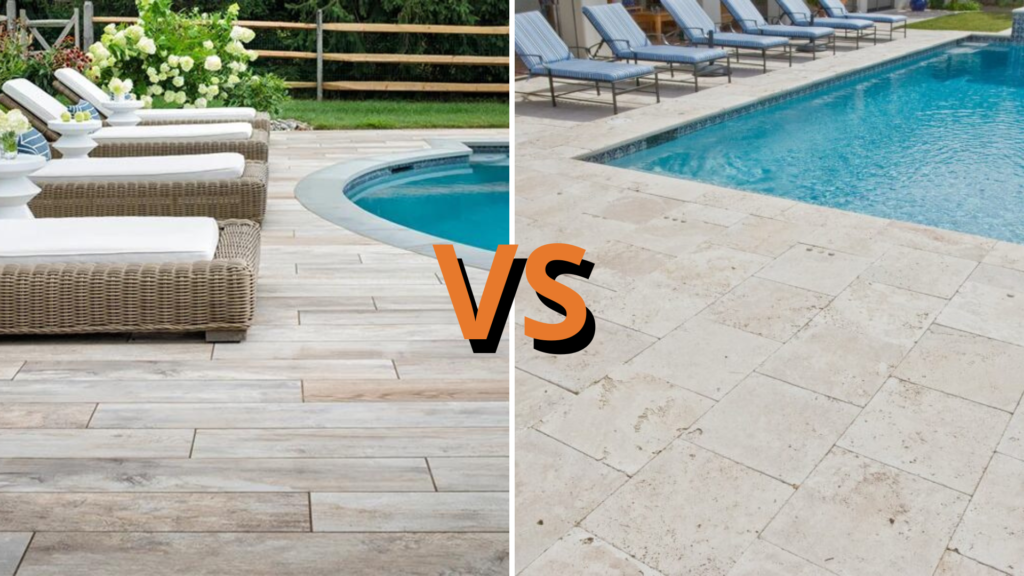
Jump to:
Porcelain pavers vs travertine pavers: what to look for
When comparing pavers, it is important to keep in mind what aspects exactly we are comparing. That helps to keep things organized and to know what matters for you or not, according to your specific scenario.
To start, we are going to talk about the materials themselves, what are they made of, and how their manufacturing process works. Then we are going to compare certain specific characteristics:
- Durability
- Maintenance
- Cost-effectiveness
- Versatility
So let’s get right to it!
Manufacturing
Porcelain pavers
Porcelain pavers are made from dense ceramic clay that undergoes a high-temperature firing process. This manufacturing method ensures the pavers are extremely durable and resistant to wear, making them suitable for various outdoor applications.
The pavers’ composition and firing process gives them remarkable strength and hardness, allowing them to withstand heavy foot traffic, extreme weather conditions, and other environmental factors.
One of the notable features of porcelain pavers is their versatility in design. They are available in a wide array of colors, patterns, and textures, providing homeowners and designers with a vast selection to choose from.
The pavers can mimic the appearance of natural stone, such as marble, granite, limestone, or slate, allowing you to achieve the desired aesthetic without the expense or maintenance requirements of natural materials.
Travertine pavers
Unlike porcelain, which is a man-made material, travertine pavers are natural stones formed through the process of mineral precipitation in water sources.
This geological phenomenon occurs when water containing dissolved calcium carbonate seeps through the ground and comes into contact with the air. As the water evaporates, it leaves behind layers of sediment, resulting in the formation of travertine.
One of the distinguishing features of travertine pavers is their unique appearance, which is characterized by small holes and pits on the surface.
These holes, known as vesicles, are a result of trapped air and other organic materials that were present during the stone’s formation. These natural imperfections give travertine its distinctive rustic charm and contribute to its visual appeal.
Travertine pavers come in a range of earthy tones, predominantly in shades of beige, cream, and brown. The color variations and subtle veining within each stone create a natural and organic aesthetic that blends seamlessly with outdoor environments.
Durability
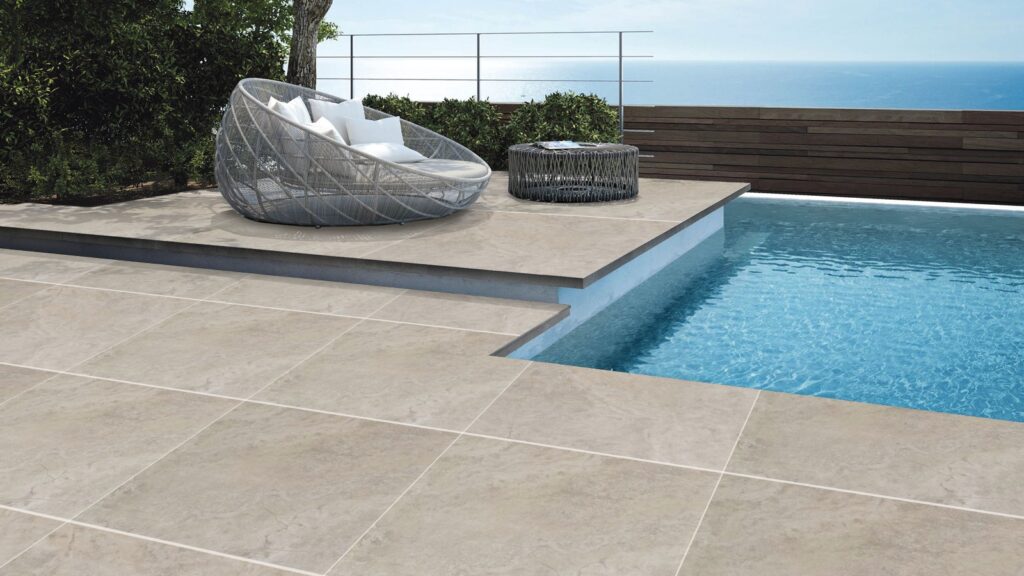
Porcelain pavers
As we mentioned, porcelain pavers are renowned for their exceptional durability and resistance.
With their low porosity and water absorption rate, these pavers are highly resistant to moisture-related issues such as mold growth and stains. This makes them an excellent choice for outdoor spaces, particularly in areas prone to heavy rain or high humidity.
In addition to their moisture resistance, porcelain pavers exhibit remarkable resistance to fading caused by exposure to sunlight. This is due to their composition, which involves firing at extremely high temperatures.
As a result, these pavers maintain their vibrant colors and aesthetic appeal over an extended period, even in direct sunlight. This resistance to fading ensures that the pavers retain their original beauty and do not require frequent maintenance or refinishing.
They are also engineered to withstand heavy loads and are well-suited for high-traffic areas. This makes them an ideal choice for spaces that experience frequent foot traffic or even vehicular activity, such as driveways, walkways, and commercial areas.
Furthermore, porcelain pavers are also resistant to abrasion. Whether it’s the movement of furniture, the dragging of heavy equipment, or the presence of playful pets, these pavers can endure the challenges of daily use without showing significant signs of damage.
Travertine pavers
Travertine pavers are highly regarded for their killer combination of natural beauty and exceptional durability. They can withstand extreme weather conditions, making them suitable for various climates and environments.
However, it’s important to note that travertine pavers have a higher level of porosity compared to porcelain pavers.
The porosity of travertine pavers means that they have more microscopic pores and natural channels within their structure. While this characteristic contributes to their unique appearance, it also makes them more susceptible to staining and water absorption.
Without proper care and maintenance, spills from liquids like oil, wine, or even water can penetrate the pavers, potentially leading to permanent stains.
To enhance the durability and longevity of travertine pavers, it is crucial to apply a protective sealant regularly. The sealant forms a barrier on the surface of the pavers, reducing their porosity and preventing stains and moisture from penetrating the stone.
Maintenance
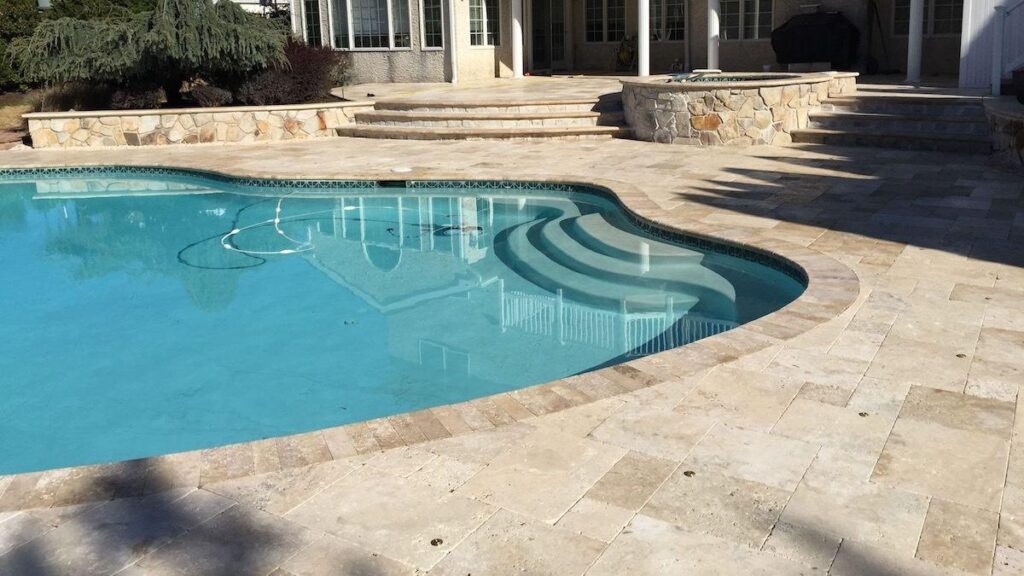
Porcelain pavers
Porcelain pavers are extremely low-maintenance.
Thanks to their non-porous surface, they are highly resistant to absorbing liquids, preventing the formation of stubborn stains. This quality is especially valuable in outdoor spaces, where accidental spills or exposure to food and beverages is common. With porcelain pavers, you can simply wipe away spills with mild soap and water, ensuring a clean and pristine surface.
In addition to their stain resistance, porcelain pavers are incredibly easy to clean. Their smooth surface allows dirt, debris, and other particles to be easily swept away, reducing the need for intensive cleaning.
Regular maintenance involves simple sweeping or using a garden hose to remove surface dirt. For more stubborn dirt or stains, a gentle scrub with a soft-bristle brush can usually do the trick.
Another significant benefit of porcelain pavers is that they do not require sealing.
Unlike some other outdoor paving materials, like travertine itself, as we previously mentioned, porcelain pavers come pre-sealed during the manufacturing process. This means you can skip the step of applying a sealant after installation, saving you both time and money.
Porcelain pavers are also highly resistant to fading. Their color and appearance remain vibrant and consistent over time, even when exposed to harsh weather conditions and UV radiation.
Travertine Pavers
Travertine pavers, while visually stunning and popular for outdoor applications, do require more maintenance compared to porcelain pavers. Their porous nature poses specific challenges that need to be addressed to ensure their longevity and appearance over time.
One of the primary considerations when it comes to maintaining travertine pavers is their susceptibility to staining. Because travertine is a natural stone with an open-pore structure, it can absorb liquids more readily than non-porous materials like porcelain.
This means that spills from food, beverages, or other substances can quickly penetrate the surface, leading to stubborn stains if not addressed promptly. To mitigate this risk, regular sealing is necessary to create a protective barrier on the surface of the pavers.
Regular cleaning is another crucial aspect of travertine paver maintenance. To avoid scratching the surface, it’s essential to use a mild detergent specifically formulated for natural stone, combined with a soft-bristle brush or mop.
Harsh or abrasive cleaners should be avoided as they can damage the pavers and compromise their appearance. Gently scrubbing the surface will help remove dirt, debris, and any built-up grime, ensuring that the natural beauty of the stone is preserved.
Cost-effectiveness
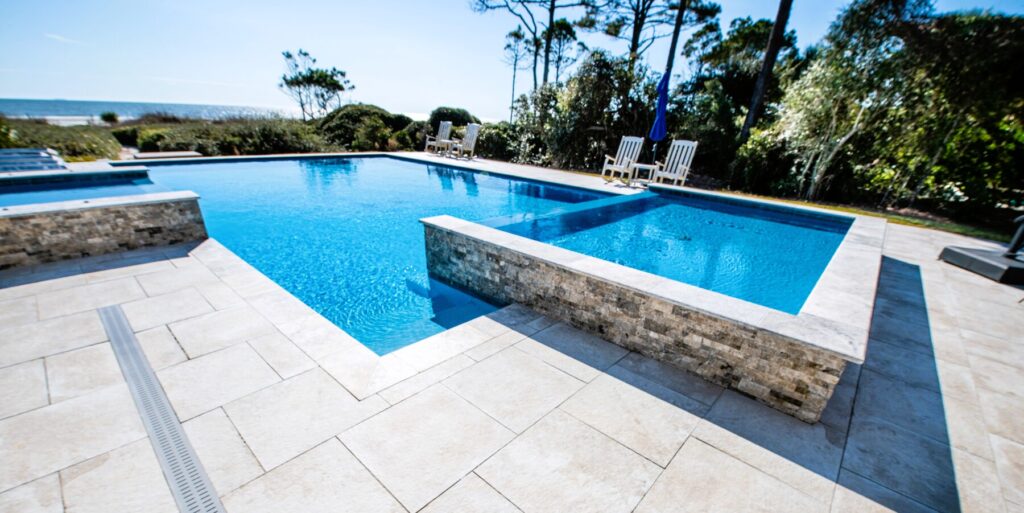
Porcelain pavers
While porcelain pavers may have a higher initial cost compared to travertine pavers, their long-term cost savings far outweigh the upfront investment. The incredible durability, low-maintenance properties, and the fact that they don’t require sealing save an outstanding amount of money in the long run.
The long-term cost-effectiveness of porcelain pavers extends beyond maintenance savings. Since they are highly resistant to fading, porcelain pavers retain their color and visual appeal even under prolonged exposure to sunlight.
This eliminates the need for periodic refinishing or repainting, reducing both the time and expenses associated with such tasks. Moreover, their durability ensures that they will maintain their structural integrity over time, minimizing the risk of cracks or damage that may require costly repairs.
The cost of porcelain pavers can vary depending on various factors such as the brand, quality, size, and design. On average, porcelain pavers range between $8 and $20 per square foot.
Travertine pavers
While travertine pavers may have a lower initial cost compared to porcelain pavers, it’s important to consider the potential additional expenses they may incur over time. The cost of sealants and professional sealing services should be factored into the overall budget when considering travertine pavers.
The frequency of sealing will depend on various factors such as the level of foot traffic, climate conditions, and the specific sealant used. Typically, travertine pavers require resealing every 1 to 3 years. On average, you can expect to spend around $0.50 to $2 per square foot for sealant materials.
In addition to sealing, regular maintenance is necessary to preserve the appearance and longevity of travertine pavers. This includes routine cleaning, removing debris, and avoiding the use of harsh chemicals that can damage the stone.
While these maintenance tasks can be performed by homeowners, some may prefer to hire professional cleaning services, especially for larger areas or for a more thorough cleaning. Professional cleaning services can range from $0.50 to $3 per square foot, depending on the complexity of the job and the service provider.
The cost of travertine pavers can vary depending on several factors such as quality, size, thickness, and finish. On average, travertine pavers can range from $3 to $10 per square foot.
Versatility

Porcelain pavers
Porcelain pavers are famous for their versatility and wide range of applications.
Being highly durable and resistant to extreme weather conditions, they are commonly used for outdoor spaces such as patios, pathways, pool decks, driveways, and courtyards.
While they are primarily designed for outdoor use, they can also be used indoors for applications such as entryways, hallways, and high-traffic areas. Their durability, stain resistance, and low maintenance needs make them a practical choice.
Porcelain pavers come in a wide range of sizes, shapes, textures, and colors. They can mimic natural stone, wood, concrete, and other materials, providing ample design options. This versatility allows you to create various aesthetic effects and match different architectural styles.
Travertine pavers
Travertine pavers are also very versatile, although not on the same level as porcelain pavers. They are commonly used for patios, pool decks, and pathways, but are not recommended for driveways.
Travertine pavers can also be used indoors for applications such as flooring, walls, and fireplace surrounds. They add a touch of elegance and natural warmth to interior spaces, particularly in areas with a rustic or Mediterranean design theme.
Travertine pavers are available in various finishes, including tumbled, honed, brushed, and polished. Each finish provides a distinct look and texture, allowing you to achieve different design styles.
They also come in a range of colors, from light beige and ivory to tan, brown, and even silver. This wide color palette enables you to choose a shade that complements your overall design concept. The natural variations and veining patterns in travertine add character and uniqueness to each installation.
One notable advantage of travertine pavers is that they tend to remain cool even in hot weather. This makes them comfortable to walk barefoot, especially around swimming pools or in sunny areas.
Porcelain pavers vs travertine pavers: final verdict
On one hand, porcelain pavers are much more resistant and cost-effective than travertine pavers. On the other hand, travertine pavers are much easier to install, much more elegant, and outshine porcelain in poll side installations on almost every front.
In the end, the decision of the battle between porcelain pavers vs travertine pavers rests in your hand, as it greatly depends on what exactly you need for your installation.
That’s why consulting with professional hardscape contractors is always the best course of action when planning a paver installation.
We here at JS Brick have worked on countless installations over our 23 years of experience, so we know how tricky things can get and how no choice is trivial when it comes to paver installations.
So get in contact with a professional around your area you can trust to help you. And if you happen to be around our area of activity, Sarasota County, FL, why not give us a call to help you?
You can contact us anytime for a free estimation of our services!

